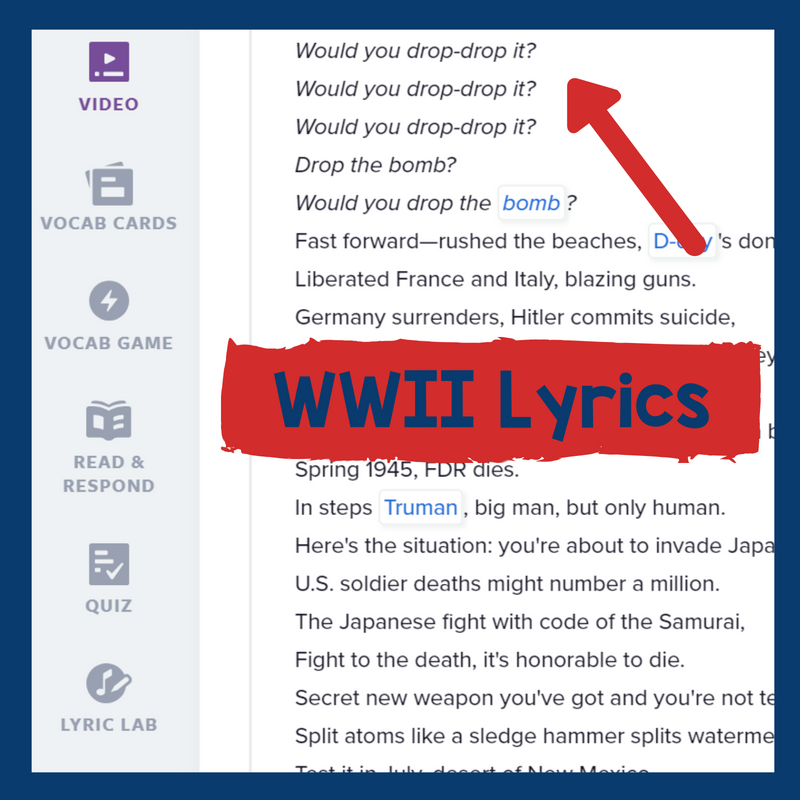
Happy back to school teachers! This week marks the beginning of my new IGTV show on Instagram and weekly blog series called the TOP HITS of the week! You can catch the show by clicking the link at the top of the page to head to Instagram or see the YouTube version at the bottom of the post. As a person who is obsessed with acrostics you know TOP HITS stands for something! TOP HITS are three historical events that occurred this week so that you can plan ahead. I’ll feature helpful ideas for integrating literacy, technology, and supporting all learners! These fun facts can be your saving grace in those transition moments, great lesson hooks, or the makings of morning work. I’ll be including significant events from across the spectrum including “born on this day, battles, inventions, sports, scientific achievements, music, arts, pop culture and more!”

Find out the interests of your students and use these tidbits as a way to build community and foster relationships with your new learners this year and spark further interest in history at the same time! Your token history nerd will appreciate them! You’re bound to at least have one! Many of my links are to history.com. I love this site. Mostly. What I don’t love is that the videos auto-play. My teenage son showed me a super helpful hack for this. Right click on the browser tab and opt to “mute site.” Let’s get started with this week in history because it’s a pretty epic one!
MONDAY
On August 6th, 1965 President Lyndon B. Johnson signed the Voting Rights Act into effect. Why was this important? This act finally put a stop to any efforts some white southerners made to keep African Americans from being able to vote. Why do I say finally? It’s because the 15th Amendment granted freed slaves the right to vote in 1870, 5 years after the end of the Civil War. However, southern states found a workaround for this by passing the infamous Jim Crow laws to impose poll taxes and literacy tests on freed slaves along with unthinkable acts of terror to discourage African Americans from even trying to vote. Have students discuss why the passage of it was necessary.
An integral part of Social Studies is analyzing cause and effect along with comparing and contrasting people, places, and events. How about have your students create a timeline of the events leading up to the passage of the Voting Rights Act including the Selma March? The movie Selma is a powerful one. I suggest using the movie trailer on IMDB. As always preview first and note that IMDB.com may use ads. Your students may have already seen the movie which makes for a great connection to the content! Here’s the link: Selma trailer.
If you know me, you know I’m a huge fan of the website http://Flocabulary.com, which features engaging and educational raps. I’m such a fan that I became a Flocab MC Educator, which means I’m a brand ambassador. I just share the love for the glory and sometimes swag because it’s an invaluable learning tool! I mention this because Flocabulary has a Voting Rights Act and Selma March unit which includes the video and multiple teacher resources and even a new vocabulary game. If you don’t have a subscription, you can check it out with a free trial. Head here for the Voting Rights Act unit and don’t miss the other Civil Rights related raps: https://www.flocabulary.com/unit/voting-rights-act-selma-march/ Want to read more about this event? https://www.history.com/this-day-in-history/johnson-signs-voting-rights-act
20 years prior another major event in American history took place. August 6th was also the day the atomic bomb was dropped on Hiroshima. By this time in 1945, the European theater of war was closed. The one in the Pacific wasn’t. The Allies were ready for the war to be over period and our troops to return home. A land invasion of Japan meant the chance for mass casualties. President Truman wasn’t willing to risk it with the brutal invasion of Normandy on D-Day so recent. He made the controversial choice to drop the bomb in the hopes that the Japanese would surrender. They didn’t. So three days later on August 9th, 1945 another bomb was dropped on Nagasaki which did lead to a surrender and thus the end of the war.
In Flocabulary’s WWII unit, the song hook is “Would You Drop It? This is the makings of a great critical thinking quick write or debate because as you know many innocent civilians were killed and countless others were affected by the radiation for decades to come. Click the picture to check out the unit!
When dealing with sensitive topics, it’s important to give students an outlet. I recommend the story of Sadako and the Thousand Paper Cranes, which is the story of a girl who comes up with a way to promote peace despite suffering from leukemia due to the atomic bomb. I also recommend using Windows Notes for most topics in Social Studies. Have students draw 4 boxes and label them Facts, Feelings, Questions, and Connections. You can also give them specific prompts. For further reading follow these links: Hiroshima Nagasaki
TUESDAY
On August 7th, 1782 George Washington created the Purple Heart! I had no idea this distinction of valor and bravery had been around since the days of the founding fathers. Ask your students if any of their family members have received a Purple Heart. Learn more here: Purple Heart
Another notable event was the Gulf of Tonkin Resolution. In case you’re like I was and know it sounds familiar but need a refresher I will help you out. The passage of this by Congress in 1964 paved the way for the U.S. taking a more active role in stopping the spread of Communism in east Asia, primarily Vietnam. If you want to open up that forever can of worms go for it. You know the one. The one where people felt America should not have gotten involved. Have your students share their opinion! Wait, what?!?!? Breaking news. Flocabulary has a brand new Vietnam War unit! I promise I don’t work for them! Just a mega fan! Here’s more about this event: Gulf of Tonkin Resolution
WEDNESDAY
After months and months of investigation and his impeachment due to the Watergate scandal, President Richard Nixon resigned on this date in 1974. He is the only U.S. president to have resigned. He isn’t the only one to have been impeached. Have students research more about Watergate and the impact of the press or other presidents who have been impeached or left office early due to other reasons. Um, be careful with this topic because of the whole Bill Clinton situation. More info? Head here: Nixon resigns
Do you have Latino students? First of all that means that they are from a wide range of countries and not all from Mexico like some people unfortunately assume. Find out which children’s families are from Mexico because on this date an important revolutionary was born. It’s important to learn more about your student’s heritage anyways to build relationships. How meaningful would it be for you to mention that you found out that Emiliano Zapata was born on this day in 1879. The movement he created in the late 1800s to further reform for peasant farmers rooted change still taking place in the modern world. If your students aren’t familiar their parents may very well be. Have them learn more and then talk about it with their parents, who will be touched you put forth the extra effort to include their culture. Click here to learn more about Zapata!
THURSDAY
As you know, after a president leaves office, the vice president becomes president. The interesting thing is that Gerald Ford wasn’t Nixon’s original vice president yet he was sworn in on this day in 1974. Learn more about this presidential succession here:Ford becomes president.
FRIDAY
August 10th is essentially the birthday of the Smithsonian Institution! In 1846, the iconic American museum system was born. An eccentric English scientist named James Smithson passed away in 1829 leaving a large sum of money to the United States requesting that it be used to further knowledge. So it’s no surprise it took a lot of discussion and back and forth with the British to decide what to do with the unusual gift. President James K. Polk was the one who finally signed the legislation to establish the Smithsonian which is now comprised of multiple different sites. A writing prompt? What else could America have done with the money? Or what type of museum would you create? Also, you could have students create a timeline of each individual museum’s opening including the most recent opening of the Smithsonian National Museum of African American History and Culture. Do you have kiddos who have visited Washington DC. Let them be the expert and share their experience!
Got kiddos who like music? On this date in 1937 the first electric guitar patent was issued?? What??? Sure took awhile for rock and roll to evolve! Learn more here!
SATURDAY
Speaking of music, did you know that the birth of hip hop can be traced back to a birthday party in the Bronx on this date in 1973? Discuss what other musical forms have been born in New York! Harlem Renaissance anyone? More info here: birth of hip hop! August 10th brings us the roots of hip hop, right? Speaking of “roots”, author Alex Haley was also born on this day in 1921! Learn more here: Alex Haley

